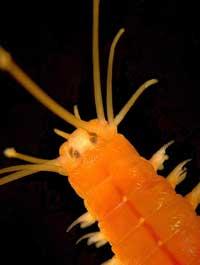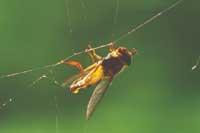Genetic disorders Genetic disorders
2006/01/22 Rementeria Argote, Nagore - Elhuyar Zientziaren Komunikazioa

One of the ways to investigate the evolution of the species are the genes: the study of the genome of the species allows to know the evolution of the DNA. So far have been decoded the genomes of animal species such as man, man, chimpanzee, mouse, rat, dog, which has already been reported in December, the malaria mosquito, the canica fish… And the researchers have compared these genomes.
What separates us, what unites us
For example, at the beginning of last year, they announced that they decoded the genome of the balloon fish. Among vertebrates, the balloon fish is the animal with the lowest genome. Their cells contain between eight and nine times less DNA than humans. Comparing the DNA of both, both came, in part, to the ancestor they had in common.
Now the researchers have done it even further back and compared it to the genome of a marine worm. This worm is called Platynereis dumerilii and morphologically is very similar to some fossils of six hundred million years ago. For this reason it is known as “living fossil”, since it is a species that has hardly evolved.

This marine worm seems very simple, but its genome is not. Formerly it was thought that the genome of morphologically simple species was also simple, but they have seen that belief was erroneous. Some species do have a simple genome, such as flies. It seems that, above all, the species of rapid evolution have been directed to a simpler genome, especially invertebrates, like flies. However, animals that evolve slowly seem to maintain most of the genome.
For example, human genes are much more complex than those of the fly. It has evolved quite slowly and research with sea worms has shown that intronas of genes have remained in evolution. Intronas are parts of genes that do not encode proteins and, to some extent, show the complexity of genes.

The truth is that part of the genome of this marine worm has been decoded in the Molecular Biology Laboratory of Europe and, compared to human genes, have seen that worm genes are as complex as humans. In addition to intronas, these intronas are found in similar positions in the genes of the worm and in humans.
An answer and eleven questions
Thus, it has been clear that the animals of that principle already had complex genes and that many invertebrates have evolved in favor of a simpler genome, like flies. On the one hand, and on the other, they have seen that intronas are parts that have remained in human evolution for a long time.
Evidently, the evolution of the species has been more complicated than expected. The more genetic studies are done, the more evident is the need for more research, since, together with a question, eleven more questions are raised.
Published in 7K.




